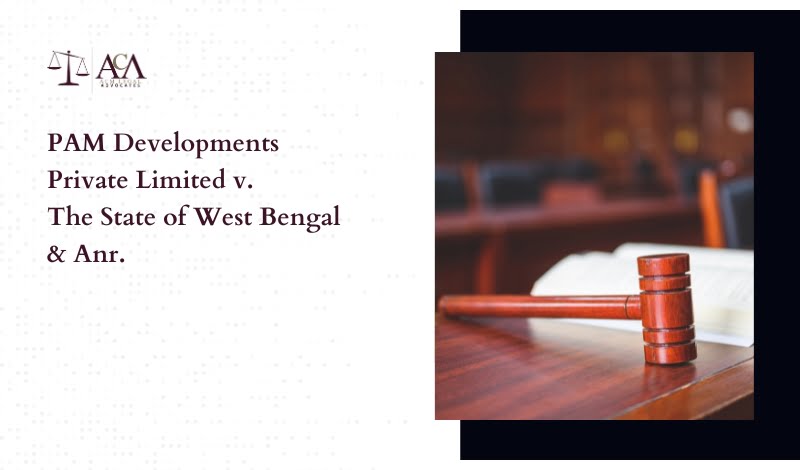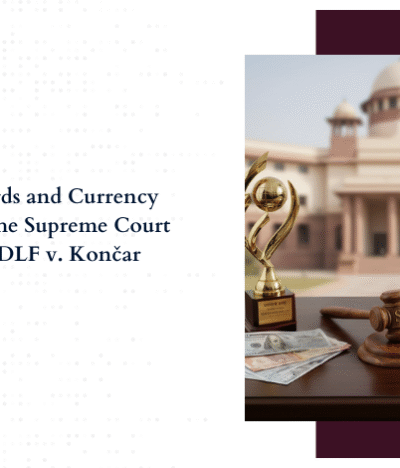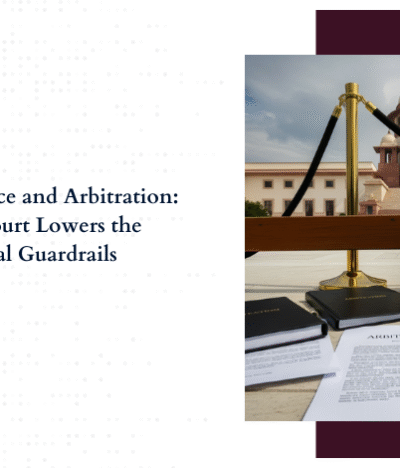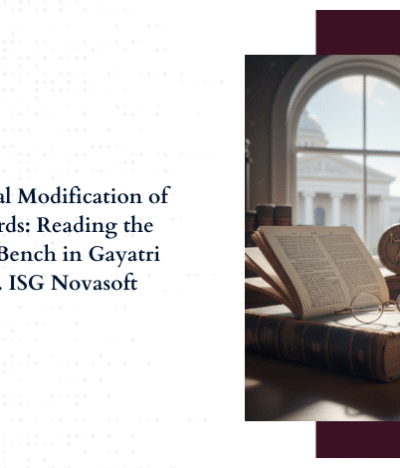The case focuses on the Supreme Court of India’s decision in a dispute arising from a contract between a contractor (the appellant) and the State of West Bengal (the respondent). The dispute pertains to claims for damages due to delay and other issues related to executing a road construction project. The case presents significant questions regarding the scope of judicial interference in arbitral awards under Sections 34 and 37 of the Arbitration and Conciliation Act, 1996.
Facts of the Case
The State of West Bengal issued a notice inviting tenders on 08.09.2010 to widen and strengthen the Egra Bajkul road under the Tamluk Highway Division in Purbo Medinipur District. The appellant’s offer was accepted, and a Work Order was issued to complete the project within 18 months, starting on 23.12.2010. Despite a five-month delay, the project was completed by 09.11.2012.
Disputes in the Matter
The appellant raised a final bill of Rs.77,85,290/- and made seven additional claims, alleging delays caused by the respondent. These disputes were further referred to arbitration.
Arbitral Award
On 30th January 2018, the Arbitrator awarded Rs.1,37,25,252/- in favour of the appellant, including amounts for loss of business, uneconomic utilization of machinery, labour charges for work stoppages, interest on delayed payments, escalation costs, and legal fees.
Challenges to the Arbitral Award
Dissatisfied with certain aspects of the award, both parties pursued legal remedies. The respondent challenged the award under Section 34 of the Arbitration and Conciliation Act, 1996, leading to the District Judge setting aside some claims. Subsequently, both parties appealed under Section 37 of the Act, resulting in the Calcutta High Court modifying the award further.
The appellant, aggrieved by the High Court’s decision concerning Claim Nos. 3, 4, and 6, approached the Supreme Court for relief.
Issue
The primary legal issue in this case was pertaining to the question of Law, which is as follows:
- Whether the claims for loss of business (claim no. 1), uneconomic utilization of machinery (claim no. 2), and other related claims could be upheld or modified based on the arbitration agreement and the specific terms of the contract.
- Whether the High Court’s reversal or modification of the Arbitral Award on certain claims was justified.
Analysis
The case revolves around the Supreme Court of India’s ruling on a dispute between a contractor (the appellant) and the State of West Bengal (the respondent) arising from a road construction contract. The dispute involves claims for damages due to delays and other issues during the project’s execution. The case raises important questions about the extent of judicial intervention in arbitral awards under Sections 34 and 37 of the Arbitration and Conciliation Act, 1996.
Claims and Judicial Findings
For the first claim, that is with respect to Loss of Business, the arbitrator awarded ₹3,87,530 for loss of business. The Supreme Court upheld the setting aside of the award for this claim, emphasizing that the arbitrator cannot award amounts beyond the scope of the claims presented.
For the second claim, that is with respect to Uneconomic Utilization of Plant and Machinery, the arbitrator awarded ₹61,22,000 for the uneconomic utilization of plant and machinery. With regard to this claim, the Supreme Court affirmed the High Court’s decision, holding that the arbitrator’s award on this claim was within the scope of the contract.
For the third claim, that is with respect to Labour Charges for Uneconomical Stoppage of Work, the arbitrator awarded ₹5,80,500 using the Hudson’s formula for uneconomical stoppage of work. The Supreme Court upheld the High Court’s decision, emphasizing that the arbitrator failed to consider specific contractual clauses prohibiting such claims.
For the fourth claim, that is Interest on Delayed Payment of Running Account Bills and Escalation Bills. The Supreme Court disagreed with the High Court, reinstating the arbitrator’s award. The Court emphasized that the arbitrator’s reasoning was sound and that the High Court’s interference was unwarranted under Section 37.
For the fifth claim, that is with respect to the Escalation Bill, the arbitrator awarded ₹11,51,198 for escalation. The Supreme Court found no reason to interfere with the lower courts’ decision who had upheld the arbitrator’s award.
For the sixth claim, with respect to Interest on the Sum Awarded, the arbitrator awarded interest at 12% per annum from April 12, 2016, to January 30, 2018, and post-award interest at 9.25% per annum. The Supreme Court emphasized the arbitrator’s discretion under Section 31(7) of the Act to grant interest, and reinstated the award, allowing both pre-reference and post-award interest.
The case underscores the limited scope of judicial interference in arbitral awards. Section 34 allows courts to set aside awards only on specific grounds such as incapacity, invalidity of the arbitration agreement, procedural unfairness, and conflict with public policy. Similarly, under Section 37, appellate courts are to exercise restraint and should not re-appreciate evidence or substitute the arbitrator’s view with their own, unless the award is perverse or patently illegal.
The Supreme Court, in its analysis, reiterated that arbitral awards should be respected as final and binding, with courts exercising only minimal intervention. The Court emphasized that arbitral tribunals are the masters of the quantity and quality of evidence before them, and their decisions should be interfered with only in cases of manifest illegality or irrationality.
Interpretation of Contractual Clauses
The case also highlights the importance of strict adherence to contractual terms by arbitral tribunals. In Claim No. 3, the Supreme Court upheld the High Court’s decision to set aside the award, as the arbitrator had ignored clear contractual provisions prohibiting claims for idle labor. This serves as a reminder that arbitrators must base their decisions within the four corners of the contract and that any deviation from the terms may lead to the setting aside of the award.
Award of Interest under Section 31(7) of the Act
The Supreme Court’s ruling on Claim No. 6 clarifies the arbitrator’s discretion under Section 31(7) of the Act to award interest. The Court stressed that unless explicitly barred by the contract, the arbitrator has the power to grant interest for the pre-reference, pendente lite, and post-award periods. This decision aligns with previous judgments, such as State of Haryana v. S.L. Arora & Co., which affirmed the arbitrator’s authority to award interest.
Application of the Hudson Formula
The application of the Hudson formula in determining compensation for idle labor and machinery was another point of contention. The Supreme Court implicitly questioned the appropriateness of this formula in the context of the specific contract at hand. The judgment suggests that while the Hudson formula is a recognized method for calculating damages, its application must be consistent with the terms of the contract and the factual matrix.
In the case of ONGC Ltd. v. Saw Pipes Ltd., the Supreme Court held that an award could be set aside under Section 34 if it was contrary to the terms of the contract or if it was in conflict with the public policy of India. This case laid down the foundation for understanding the scope of judicial review in arbitral awards. The case of Associate Builders v. DDA, elaborated on the grounds for setting aside an arbitral award under Section 34, particularly focusing on the concepts of “public policy” and “patent illegality.” The Supreme Court in the present case applied the principles from Associate Builders to evaluate the High Court’s interference with the arbitral award. Additionally, the State of Haryana v. S.L. Arora & Co. clarified the arbitrator’s power to award interest under Section 31(7) of the Act. The Supreme Court in the current case referenced this judgment while upholding the award of pre-reference interest by the arbitrator. Furthermore, The Supreme Court in Ssangyong Engineering & Construction Co. Ltd. v. NHAI emphasized the limited scope of interference with arbitral awards under Sections 34 and 37. It reaffirmed that courts should not act as appellate authorities in arbitral matters, a principle that was crucial in the present case.
This judgment underscores the sanctity of contractual provisions in arbitral proceedings while also reaffirming the Arbitrator’s discretion under statutory provisions when the contract is silent. It delineates the boundaries of judicial intervention in arbitral awards, emphasizing respect for the Arbitrator’s findings unless they contravene explicit contractual terms or fundamental legal principles.
Conclusion
The Supreme Court, while affirming the High Court’s decision on claim no. 3, reversed the lower court’s rulings on claims 4 and 6. In doing so, the Supreme Court largely restored the Arbitrator’s original decision, which had been previously upheld by the District Judge.
This action underscores the court’s recognition that the Arbitrator’s interpretation of both the contract and the factual circumstances was reasonable and should be respected. The judgment serves as a significant reinforcement of the principle that arbitral awards, particularly in technical and contractual disputes, should not be easily overturned. It emphasizes that courts should not intervene unless there is clear evidence of overreach, jurisdictional error, or conflict with public policy.
The key takeaway is the reaffirmation of judicial restraint under Sections 34 and 37 of the Arbitration Act. The court’s decision highlights the need to respect the autonomy of the arbitration process, only allowing judicial intervention when substantial and compelling reasons are present.
This ruling strikes a delicate balance between upholding contractual obligations and ensuring that parties receive fair compensation, particularly for damages arising from delays. It underscores the importance of preserving the integrity of arbitral awards, thereby supporting the effectiveness and efficiency of arbitration as a means of dispute resolution.






